1 of 14
By Diana Fehling
The athletes had great weather at Middle Island Country Club, when the Comsewogue/Miller Place combined golf team went against Sachem on March 22.
Sachem won 8-1.
— Photos by Diana Fehling
By Diana Fehling
The athletes had great weather at Middle Island Country Club, when the Comsewogue/Miller Place combined golf team went against Sachem on March 22.
Sachem won 8-1.
— Photos by Diana Fehling
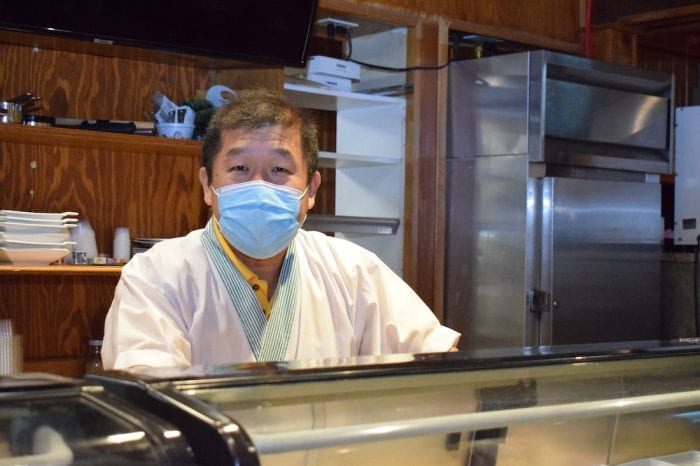
A Miller Place woman is asking sushi connoisseurs to help support a local business who was hit hard thanks to the COVID-19 pandemic.
Benten Sushi and Fine Japanese Cuisine on Route 25A has been struggling to keep their doors open, like many restaurants and small businesses, over the course of the last year.
Marlene DuBois, a friend of Kenneth Lee — who has owned the spot for nearly two decades — decided to start up a GoFundMe online, to help support him as he adjusts to this new normal.
“He’ll never ask for help,” she said. “But he was mentioning there were some problems and I knew this was a serious thing.”
DuBois said she and Lee have been friends for about 30 years, since his family opened up their first location in Mount Sinai, but she’s also a good customer — noting that the sushi at Benten is different than all the rest.
“He is a real stickler for authenticity,” she said. “It’s super fresh, he’s the only person who gets fish from local Long Island fishermen.”
Compared to other local sushi joints, he offers pure authenticity. A quiet business owner, when Lee mentioned his stress maintaining his shop throughout the pandemic, DuBois said something had to be done.
“If we go on for another six months to a year in the pandemic, all our local eateries are going to be gone,” she said. “Any mom and pop shop that we can help, and support is important.”
DuBois created the online fundraiser in early February and to date it has over $2,500 of generous donations that will go to Lee’s location.
And he was shocked when he found out his friend was doing this.
“I am so grateful,” he said, modestly. “It’s been very tough.”
Lee said the funds his friend raised will go to upkeep of the restaurant, which has been too expensive to fix in COVID times.
DuBois said that supporting a restaurant, like Benten, is crucial as Long Island nears the one-year mark of quarantine.
“If people don’t want to donate to the GoFundMe, I’m just trying to encourage them to order from him,” she said. “Support your favorite restaurants… It’s important.”
The ALS Ride for Life board of directors unanimously appointed Ray Manzoni as president of the organization.
Manzoni, of Miller Place and proprietor of Manzoni Real Estate located in Mount Sinai, replaces Chris Pendergast, a beloved community member and founder of the nonprofit, who died of amyotrophic lateral sclerosis in October after a 28-year-long battle.
But Manzoni said Pendergast’s legacy will live on, and he’ll be there to help see the organization through.
When ALS Ride for Life was incorporated back in 1997, Manzoni stood alongside Pendergast — a man he became good friends with.
“We had been friends for years before he was diagnosed. Then he sucked me in and here I am 28 years later,” he laughed. “I knew him well. I knew his mind. He taught me well.”
While Pendergast was still alive and spreading awareness on ALS (often referred to as Lou Gehrig disease), the new president served on the board of directors, eventually — and currently — as board chairman.
“Chris was a nationally known leader in the world of ALS,” Manzoni said. “I was proud to be his friend. I look forward to continuing his mission and that of our organization toward providing patient services, awareness and supporting research so that a cure can one day be found.”
ALS Ride for Life started when Pendergast embarked on a ride with his electric scooter from Yankee Stadium in the Bronx to Washington, D.C., 22 years ago to raise awareness about the disease and raise funds for research. After a few years, the ride was contained to New York state — from Riverhead to the Bronx — where participants stop by schools along the way that take part in the organization’s presentations throughout the school year.
Pendergast, a Miller Place resident and former Northport elementary teacher, had lived with the disease for 28 years. When doctors diagnosed him, they thought he only had a few years to live. He lived to be 71.
Pendergast became an icon and symbol for the North Shore for never giving up.
Even as he lost the ability to speak and had to communicate with an eye-to-speech device, his determination never seemed to relent. Just this year, Pendergast, alongside his wife Christine, released the book “Blink Spoken Here: Tales from a Journey to Within” about his life since his diagnosis in 1993.
The ALS Ride for Life organization has raised over $10 million for advocacy and research. Their yearly Ride for Life trips were later accompanied by visits to close to 90 school districts on Long Island.
“His story still resonates,” Manzoni said. “ALS is not gone.”
The new president is looking forward to keeping Pendergast’s legacy alive.
“We fortunately have this great team,” he said. “We held it all together and are refining in these COVID times.”
Known to visit schools and give presentations on the disease, the group had to change shape to get their word out, while adhering to coronavirus guidelines. But he is asking people to continue supporting their local nonprofits.
“The kids want this, administrators want this,” he said.











It was senior night for Miller Place in a League VI matchup where despite a late game surge the Panthers fell to visiting Islip 55-42 Feb. 22.
The quartet of seniors topped the scoring chart for the Panthers with Charlie Byalick leading the way with 3 triples 2 field goals and three from the line for 16 points. Kyle Callahan scored a three pointer and 3 field goals for 9 points, Vincent Maronski followed with 7 and Matt LoNigro banked 6.
In a COVID-shortened schedule the Panthers will conclude their season with a road game at Bayport-Blue Point Feb 24, the results of which were unavailable at press time.
Photos by Bill Landon








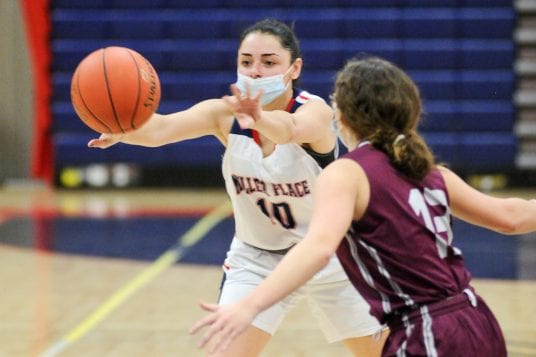


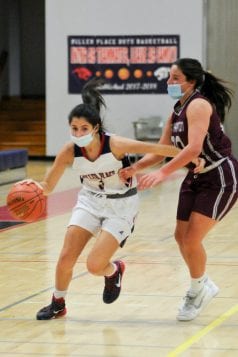


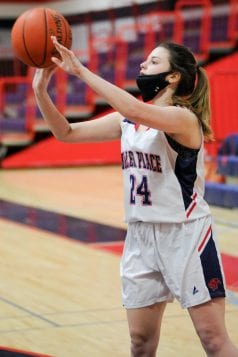
The Miller Place Panthers couldn’t ask for a better start in this COVID shortened season. With a 46-20 win at home against East Hampton Feb. 11, building on their momentum from a victory over Amityville in their season opener earlier in the week.
Seniors Alexa Corbin topped the scoring chart for the Panthers with 18 followed by teammate Jessica Iavarone who banked 10, with Lauren Molinaro a junior netting 8.
At 2-0 Miller Place sits atop the League VI leader board tied with Islip. The Panthers are back in action Feb. 13 on the road against Sayville Feb. 13 before returning home on the Feb. 17 to host Mt. Sinai. Tip off for both games is 10 a.m.
Miller Place School District’s annual registration process for Andrew Muller Primary School’s kindergarten begins Monday, March 1 through Friday, March 19. Miller Place-Sound Beach children who are five years old on or before Dec. 1 are eligible to enter kindergarten for the 2021-2022 school year.
As part of the two-step process, residents will begin by scheduling a mandatory appointment via the district’s online platform. In order to avoid any delay in the registration process, please have the following documentation accessible and available for each child that is entering kindergarten at the time of your scheduled appointment: 1) completed registration packet, 2) original birth certificate, 3) immunizations and current physical from your child’s physician, 4) proof of residence, and 5) custodial documentation (if applicable). Please note, incomplete registration packets will not be accepted and you may be asked to reschedule.
Registration appointments will be conducted at Central Office located at 7 Memorial Drive, Miller Place. For more information regarding the registration process, please call Natalie Vazquez at 631-474-2700 ext. 728.
For more information about the Miller Place School District, please visit the District’s website.
To commemorate American Heart Month, February is dedicated to heart disease research and heart health care. Dawn Blatt, a resident of Miller Place, had a heart attack on Feb. 20, 2012, while on vacation with her family and chooses to share her story.
While in California, she began feeling chest pressure that lasted about 20 minutes and eventually went away. She thought it was nothing, and didn’t want to say anything or ruin the trip.
“About two hours later, when we were sitting in the hotel, that chest pressure came back and actually got worse,” she said. “I started getting pain down my left arm, the chest pressure turned to some pain. I was feeling anxious.”
Blatt knew something was going on and she had to act on it. She was getting ready to head into the elevator to catch a ride to the hospital in a city she didn’t know when her husband called 911.
The paramedics did vitals and were talking about EKG changes in her hotel room. Blatt, a physical therapist, heard terms that are usually said to her patients — not typically to her.
The then 46-year-old was taken by ambulance to the hospital and after talking with a doctor, he said that she did indeed have a heart attack.
“That sense of denial that I was having the whole time even though I knew what the symptoms would correlate to was still a shock for me to hear those words,” she said. “And everybody that came in to the room kept saying, ‘Oh, you’re so young!’ and that really got me angry after a while because obviously I wasn’t too young — I had a heart attack.”
The mother of two did not have previous signs or symptoms. She didn’t have the risk factors that would lead people to think she would have a heart attack. Blatt said she was always on the treadmill and was an active person.
“The recovery was physically and emotionally challenging for me,” she said.
In California, to address her cardiac catheterization, one stent was put in her left anterior descending artery in her heart during 1st cardiac catheterization, and four more were added when she came home to New York.
Nearly nine years after the heart attack, Blatt now has no restrictions or limitations.
“I feel like I was lucky,” she said. “But since then, I have started to learn about the fact that so many women are not aware of risk factors, or that the signs of a heart attack can be different for women, especially.”
So, she’s using her voice to talk to others and build a supportive community for people who’ve have been through similar situations. An active member of the national organization WomenHeart, she’s there for other women who have dealt with heart problems big and small.
“The women that I have met through WomenHeart are my heart sisters, and they’re the people that get it,” she said. “It’s so helpful to be able to ask questions of people who’ve been through similar experiences, and that can help give you support or ask questions. That’s why I have decided to help spread the word, raise awareness and support other women living with heart disease.”
Blatt added that sharing her story with others not only gives them someone they can relate to, but is a healing experience for her, as well.
According to Blatt, she has learned a lot of facts about heart health from the nonprofit. WomenHeart has a directory of scientific data, links, an advisory panel of doctors and researchers throughout the country, and is trustworthy and credible.
She said, for women specifically, it’s important to know that heart disease is the leading cause of death for women and there are plenty of signs to know when something wrong is happening.
“A lot of people think, ‘Younger women don’t have heart attacks, they don’t have heart disease,’ but I’ve met so many women in their 20s, 30s and 40s with various forms of heart disease,” she said. “It’s not just an old man’s disease anymore — it’s affecting women.”
Blatt said there’s more to a heart attack then pressure pain in the left arm, and it’s not “just an anxiety attack.”
“Pay attention, seek medical attention, seek medical care, get answers to your signs and symptoms, and if you’re not happy with what they’re telling you, get a second opinion,” she said. “When women go to the ER, if they think they’re having a heart attack, use the words ‘I think I’m having a heart attack.’ That will get you in, otherwise you’re going to be waiting. When you’re having a heart attack, the quicker you get in and get treated, the less damage you can have.”
Friday, Feb. 5, is National Wear Red Day. Everyone is encouraged to wear red and raise support for American heart health.

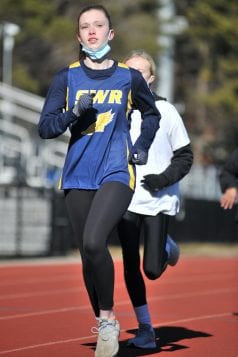
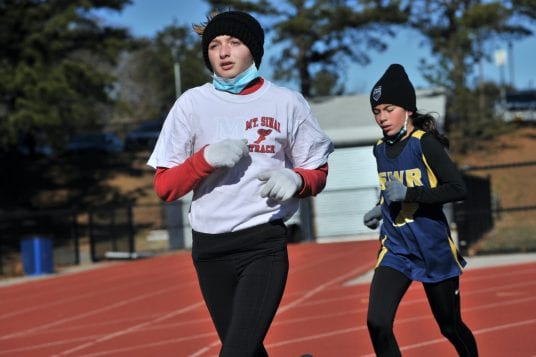






Girls winter track is usually run in indoors where short sleeves and running shorts are the norm. But in this year of the COVID-19 pandemic, there’s nothing normal so it’s outside this season and on Sunday it was 28 degrees with gusty winds at the opening gun.
Shoreham-Wading River hosted Mount Sinai and after taking to the track holding a lead over the Mustangs because the field events were contested earlier in the week. The Wildcats had the upper-hand on the day and took a 74-44 victory to open their season Jan. 24.
Mt. Sinai (0-2) will look for that first win of the season at home against Islip on Jan. 30 at 11:00 a.m.
The Wildcats are also back in action on the 30th where they’ll host Miller Place.
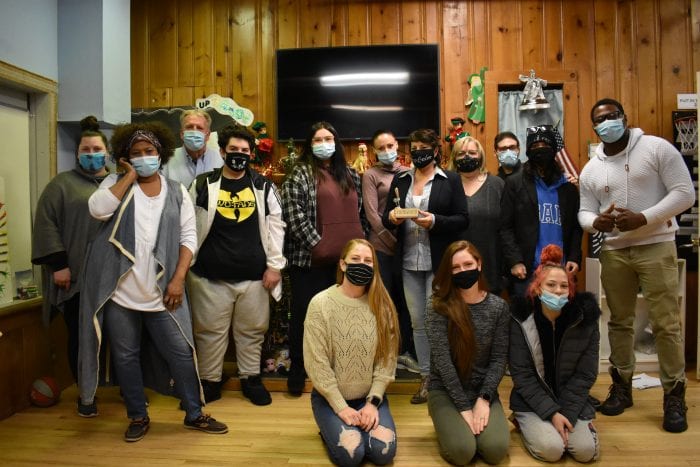
When the first weeks of the pandemic hit, when everything from restaurants to gyms to playgrounds were being shut down, schools were forced closed as well.
As the many different districts across Long Island scrambled to implement distance learning, a new crisis loomed. For the many men and women who still worked, especially those on the frontlines in hospitals or elder care facilities, they could no longer depend on school districts to take care of their children for most of the day.
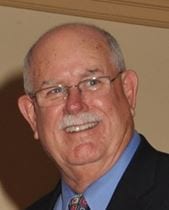
And as parents scrambled to find ways to take care of their children, a few groups stepped up to the plate. Many parents owe a great deal to those organizations that took care of their children during the pandemic’s worst months, many of whom were trailblazers for what kids would come to expect when schools finally reopened in later months.
Organizations from all over kept their child care services going when they were needed most. The Huntington YMCA, while suspending many of its other youth and adult programs, kept running its child care services and food pickups for families. This was even amongst huge economic hardship caused by the loss of membership dues.
Eileen Knauer, senior vice president of operations for YMCA of Long Island, said their child care programs ran for four months out of their Huntington facility as well as a school in the South Huntington school district, up until their summer camp programs started again. While it initially ran free of charge for parents, having been supported by stipends from the school district and Northwell Health, they did end up having to charge parents some cost for the program. For those parents who did not have enough to pay, they fundraised to help support their children.
“The ‘Y’ is here for our community — we respond to what the community tells us we need,” Knauer said.
SCOPE Education Services, a Smithtown-based nonprofit chartered by the New York State Board of Regents, operates child care programs all over Long Island. Though SCOPE normally works with school districts from all over, in March, when districts were mandated to provide child care even while their buildings were closed to normal activity, they turned to SCOPE, according to George Duffy, executive director.
The nonprofit operated 25 locations throughout Long Island to provide that child care, with more than 800 children in total enrolled. From March through August, SCOPE workers kept children in safe spaces, allowing them an opportunity to socialize when many were feeling the emotional constraints of isolation.
Though districts pay a weekly stipend to help run the program, for parents who desperately needed people to take care of their children while working, it was effectively free.
Lori Innella-Venne, a district manager for SCOPE operating in the Huntington area, said it was soon after the closures were coming into effect that she and her workers sat together to come up with a plan, creating something entirely new on the fly, even when restrictions and medical advice seemed to be changing on a daily basis. Despite all that, the program never saw a positive COVID-19 case amongst its children, she said.
“We took one breath when schools closed and we immediately got to work, reimagining how we did everything,” Innella-Venne said.
Over in Rocky Point, the North Shore Youth Council, a nonprofit that services districts from Mount Sinai to Shoreham-Wading River, was also caught up in that first COVID wave that crashed upon Suffolk County. Their summer camp, which featured 100 kids, was so effective in its procedures that it did not see a positive case in the several months the program ran.
NSYC Executive Director Robert Woods said they also had the benefit of good relationships with the Rocky Point school district, and that it was the district’s custodial staff who were “rock stars” in helping to prepare children for these activities.
It was difficult, of course. Children could not even play board games together. Innella-Venne said they had to draw up an entirely new curriculum. Activities had to focus on being spaced apart. Equipment that was once shared now had to be restricted to individuals, and then sanitized after use.
“When we were still waiting for guidelines to come out, we already had a fully realized program, one that we found well within the guidelines and in some cases exceeded them,” she said. “There was fear in the beginning, but also incredible pride for what we were able to accomplish.”
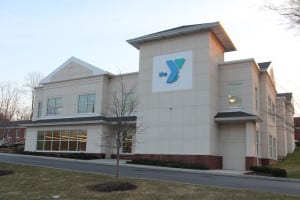
Once school started again, the demand for child care did not relax. The youth council’s afterschool program now follows in the footsteps of the local school districts’ cohort system, following those so that they don’t mix students who may have been kept separate for a significant time. They also developed a kind of study hall for those students in the hybrid model who are studying electronically, allowing parents to work even when their children are not allowed inside schools, according to Cyndi Donaldson, the youth council’s school-age child care program director.
Knauer said the YMCA has also started a program to allow children a place to do their remote work while their parents are at their jobs. Though that program had stalled once students were allowed back in school full time, it will likely start up again after December as the number of COVID cases climb and local districts expect to take a longer-than-normal Christmas break.
“If you’re a working parent, you don’t have the luxury of taking time off,” she said.
There are so many stressors with young people having to deal with so much, whether it was hearing the news and the number of people dying, or it was seeing the anxieties of their parents. It was especially hard on more at-risk kids, the kind of population serviced by The Sunshine Center in Port Jefferson Station. Carol Carter, CEO/co-founder of the organization, said they had to transfer much of their child care services online once the pandemic struck, whether it was live on Facebook or YouTube, or constant calls to catch up with parents and their children on what was happening. They took to driving out to children’s households with homework and activities or even food, trying to keep those participants engaged. The center created a blessing box where needy parents could pick up supplies and food that were donated by the wider community.
“We knew immediately how important support was through this time,” she said. “Our main focus was on positive social skills. People were feeling anxiety and other tough feelings, so developing coping skills, problem-solving skills and communication skills that kids could use during this time was important.”
All program directors agreed that their services provided a kind of stability for children during a tumultuous year.
“A parent said to me the other day that our programs are the only constant in their childs’ lives,” Woods said. “Their children look forward to coming to our programs, they are able to socialize in a different way. They are a thriving testament to what [our organization] does.”
Just like many businesses and other organizations during the pandemic, COVID has hurt their bottom line. Knauer said the YMCA is currently running at 50% below their normal revenue, as membership dues have dropped off significantly. She said anybody looking to start memberships or to donate can contact her through the YMCA at 631-421-4242.
Other programs also operated at a loss.
“SCOPE ended up losing money,” Duffy said. “We thought they were going to be running this for four-to-six weeks. We ended up running it for six months.”
But for the nonprofit service, the point was to provide that niche when it was needed.
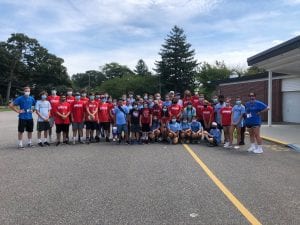
“We felt it was a valuable service that benefited families and the community,” Duffy said. “We were happy to do it — it kept people employed who would have been forced to do something drastic, like leave their job.”
The child care services were truly the first bulwark of dealing with children and students in a pandemic. Both SCOPE and NSYC officials said school districts reached out to them when coming up with their own procedures when reopening in September.
“A lot of school districts looked at what we did over the summer, asked for our input, and a lot of what they’re doing now is what we did in March,” Duffy said.
The work of these and other groups has been recognized by both school districts and parents. SCOPE has received numerous positive comments from superintendents from Brentwood to Middle Country to Comsewogue. One of the districts SCOPE operated in was Miller Place, where Marianne Cartisano, the MP superintendent, said her district would not have been able to come out of the first-wave months still with their feet under them if it weren’t for Duffy and his program.
“Parents would come back and say, ‘I didn’t worry about my child today,’” Cartisano said.
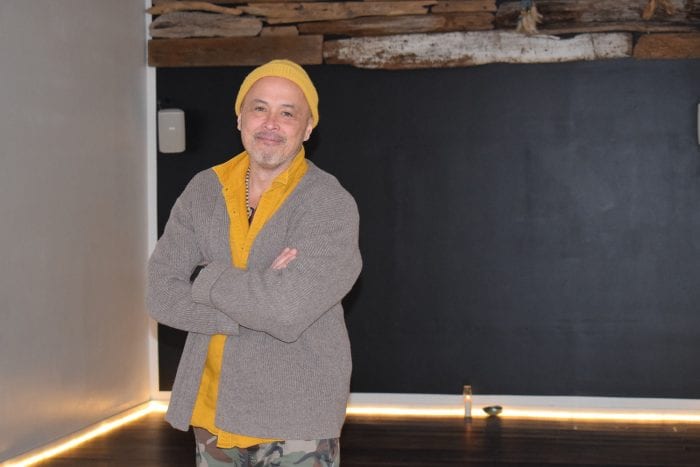
They went from selling out classes several times a day, to having one person in a class.
Coco Teodoro, owner of Miller Place and Patchogue-based Cocomotion Yoga + Movement Space, said that the virus has hit his industry just as hard as others.
“Our business, just like rock concerts, musicals, they’re in the business of bringing people together,” he said. “And that’s the one thing we can’t do. So, our entire business model is toast because if you’re good at bringing people together, then what are you good at after that?”
Teodoro said that because of the pandemic, he has lost 90% of his business — just one of many things that hit him hard in 2020.
“I kept telling everybody that this is the year of loss for me,” he said. “I lost my mom just a few months ago, then lost my job [at an advertising firm in Manhattan] of 17 years, and then I could end up losing my business.”
But Teodoro tries not to be negative. There’s hope and he sees a silver lining, despite the hardships he and his colleagues are facing because of the coronavirus.
“I always felt that as long as I can teach, I can always make it in this world,” he said.
Teodoro, a certified instructor, has been practicing yoga for more than 20 years. He opened his first location in Miller Place five years ago and added a second space on the South Shore in 2017.
In March 2020, he was all ready to open up his third location on top of that in East Setauket. He took over the second floor of the Country Corner Bar on Route 25A and then the virus hit.
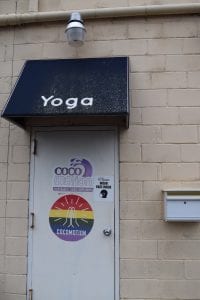
While they are still renting out the other two locations, they haven’t been able to use their Patchogue and new Setauket spaces yet.
Teodoro said they are focusing on maintaining their flagship spot in Miller Place because it’s the largest out of the three. They just recently opened up to in-person classes, where they marked spots on the floor six-feet apart. A class that once held nearly three-dozen people can now only hold eight.
“We feel like this is the safest place to practice,” he said.
And it’s been hard, he said. Early on in the pandemic, Teodoro had more than 20 instructors on his payroll, now he has just two — who are doing their classes for free. Since March, he and partner Jane Irvine were putting out over 500 yoga classes online for no charge.
“We’re actually going out of business and working at the same time,” he said. “We’re literally staying here so we can hold on to the community that we built.”
And that community has become their family.
“We know every single person,” Irvine said. “We know what’s going on in their lives. We know their children, we know what’s happening. So, we’re here, and we say that we love this family. This is our family.”
Irvine said the community has been as supportive as they could be during this difficult time, and while the business is struggling, the teachers at Cocomotion just want to make others feel better because they know of the impacts stress can cause someone.
“Pre-COVID, people would have multiple memberships,” Teodoro said. “They’d have a membership at the local gym, then they’d have a membership at the yoga studio, and then they might have a psychiatrist, as well.”
That’s how this studio is different than the rest, adding, “We decided to squeeze all three of those in.”
Irvine said that now more than ever, people need a ritual.
“People need something to devote their time to, otherwise the mind is just going to go crazy,” she said. “It gives you a focus, a point in your day to do something to take care of yourself.”
Cocomotion’s free classes are still available on their social media platforms, including Facebook and Instagram, but he’s encouraging people to take advantage of the sacred space he worked half a decade on in Miller Place.
“Everything that we’ve built is our dream,” he said. “So yes, we’re going to struggle — everybody’s struggling at this moment in time. But ultimately, we still get to wake up and have this community that we love and do what we love to do.”
